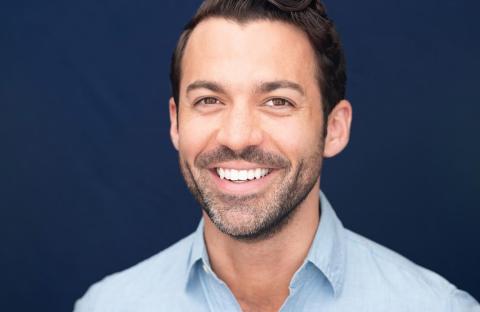Q&A with Brian Dillon

Assistant Professor of Theater Brian Dillon joined Boston Conservatory at Berklee’s Theater Division faculty in 2021. A Boston Conservatory alum, Dillon is an actor, singer, dancer, and choreographer who maintains a vibrant Broadway career—including performing in touring and Broadway productions of Disney's Aladdin for the past four years. Here, Dillon reflects on balancing teaching and performing, and how he brings lessons from the field into the classroom.
As an educator with an active career in the industry, how do you find the right balance between teaching and performing?
Even back when I was a student at Boston Conservatory, I was drawn to local theater education and outreach opportunities. I discovered that teaching actually has the power to make one a better student. Holding onto that in my professional career, performing and teaching have naturally gotten along like good friends. While working on touring shows, I often found local performing arts studios to teach choreography and hold Q&A sessions. During the pandemic, teaching was really my main gig and ultimately led to my joining the faculty at my alma mater. I think it’s a calling, and the balance is struck by making enough room for it and proactively finding the opportunities to share your gifts.
How has your experience in the professional world of theater influenced your teaching? What lessons from the field are you bringing into the classroom?
What an honor it is to be given the opportunity to share my current professional experience with Conservatory students. Passing on what I have learned is a huge part of the reason I love teaching. I remember when I was a student here, not only did I have inspiring teachers (whom I try to emulate daily) but I also remember dynamic guest speakers coming in to share their invaluable experience and advice. Having been so recently in audition rooms, rehearsal studios, on tour, and on a Broadway stage myself, I do my best to bring what’s actually happening out there to the classroom in an honest and positive way.
The lessons I hope to share from the field range from practical to personal. Last semester, we learned a handful of real Broadway dance call combinations that students can hopefully keep in their toolbelt forever (that Wicked dance call hasn’t changed). We practiced picking up choreography from video, which is the way most auditions are being held today—but hopefully not for much longer. And since I’ve been a swing for the better half of my career, we had an informative “how-to-swing” lecture, which I am always so jazzed to talk about.
On a more personal level, I believe in setting specific intentions, being present, setting attainable goals, breathing, giving 100 percent of the percentage you have to give that day, and above all, taking care of your sacred body. Speaking of the body, if you have a body and you are dancing, you have a dancer’s body. It doesn’t take looking a certain way to be super strong and healthy. And the non-negotiable, ultimate tip from the professional world: you must be kind to ev-er-y-one. Wardrobe, stage management, musicians, lighting designers, ushers…learn their names and be kind. No one does this alone!
What are some of your favorite productions you've performed in since you began teaching at Boston Conservatory?
Since joining the faculty this fall after a long, sporadically employed pandemic, I hadn’t performed in any stage productions until rejoining the Broadway company of Aladdin. That was also the last show I worked on before the shutdown started, which was two years of the tour and some time on Broadway. Since graduating, though, my favorite credit is A Chorus Line, which I have performed four times and set once.
What has teaching young theater artists taught you about performing?
That you gotta go for it! That commitment is everything. That you are so enough. That comparison is a dead-end street. That what I get to do is very cool! That I should often count my blessings being an artist. That somewhere in the audience, a young person is seeing their first show and it very well could change their life. That the arts should be more accessible to young people, especially in under-resourced communities. That there’s a lot that has to change in the industry and still a lot of work to do.
What advice do you have for students interested in juggling a performance and teaching career?
Be a sponge and then share what you soaked up.
Communicate. Plan. Let go.
Learn how to juggle.
Every moment is a teachable moment.
Know your limits and boundaries.
Know your value (and then believe it).
Spread your love and own your gifts.
